WRL Organizers Hit the West Coast
Reprinted from WRL Blog, Posted on March 12, 2011
From February 25th to March 7th,WRL organizing coordinator Kimber Heinz and field organizer Ali Issa began a three-stop trip on the West Coast where they met with WRL locals and affiliates, as well as allied organizations working on GI resistance, civilian support for anti-war veteran organizing, reparations for occupied people and Arab-American organizing here in the US. Below are some of the highlights of their trip.
The day we arrived, our first stop took us to the home of an organizer with WRL-Portland for a strategizing and visioning session that included organizers with: Washington Truth in Recruiting, Recruiter Watch, Metanoia Peace Community and the Civilian-Soldier Alliance.
The evening began with a discussion of what has been happening on the political landscape, locally in Portland, but also regionally nationally and internationally. Participants mentioned the large pro-union mobilizations in Wisconsin and elsewhere, an upcoming rally in Portland marking the 8th anniversary of the invasion of Iraq, an increased focus on military spending (both within policy circles and at grassroots levels) and the uprisings in Egypt and the Arab world as a whole.
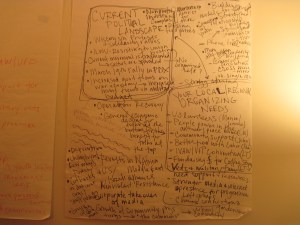 We then turned to the question of what each participant had been focusing on in their work. Among the participants counter-recruitment-of many types-was a priority, which meant working with local Portland schools to inform students of the opt-out option, attending school board gatherings to propose policies that allow counter-recruiters in schools along with the recruiters, and reaching out to communities that are targeted most by recruiters in the poverty draft: working people and people of color (a few of the attendees were involved in a recent tour to small towns with the Rural Organizing Project.) This was in addition to ongoing discussions which focused on the military budget and how it may connect to broader economic issues in the US.
We then turned to the question of what each participant had been focusing on in their work. Among the participants counter-recruitment-of many types-was a priority, which meant working with local Portland schools to inform students of the opt-out option, attending school board gatherings to propose policies that allow counter-recruiters in schools along with the recruiters, and reaching out to communities that are targeted most by recruiters in the poverty draft: working people and people of color (a few of the attendees were involved in a recent tour to small towns with the Rural Organizing Project.) This was in addition to ongoing discussions which focused on the military budget and how it may connect to broader economic issues in the US.
Next, attendees identified what organizing needs they wanted met to strengthen and broaden their work. Among these needs were:
- increased capacity
- stronger media and internet presence
- better ties to churches and unions
- getting out of the ‘peace movement’ silo/cross movement building
- models for youth leadership
- connecting to directly impacted communities
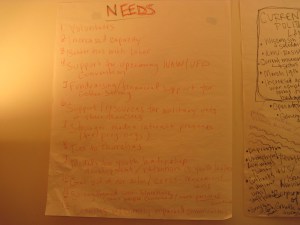 Lastly, we attempted to connect the list of happenings on the political landscape with what people’s needs were. In addition, we explored the question of how the needs of others could also be met by the work and interests of the attendees.
Lastly, we attempted to connect the list of happenings on the political landscape with what people’s needs were. In addition, we explored the question of how the needs of others could also be met by the work and interests of the attendees.
This produced a list of ‘solutions and opportunities'; which included things that attendees were already doing (such as counter recruiters working directly with a local high school ‘gay/straight alliance’, which lead to greater capacity and an exploration of how all marginalized communities are impacted by militarism.) With two solidarity rallies planned in the politically active city of Portland the next day on February 26th, one raising up the workers fighting for their rights in Wisconsin, and the other supporting the revolting people of Libya, it was clear that there was much to connnect to, and that the peace movement breaking out of its silo was necessary and eminently possible.
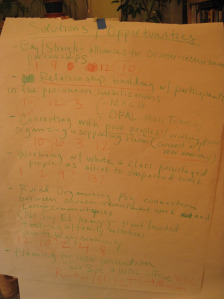 On the next leg of our trip, we traveled from Portland to Fort Lewis in Washington state to visit Coffee Strong, one of the two currently active G.I. coffeehouses in the U.S. Founded in 2008, Coffee Strong has been a space for servicemembers to meet up off-base, and provides resources to G.I.s and veterans such as information on G.I . rights, referrals to civilian mental health counselors and healthcare providers, antiwar literature, and info about antiwar G.I. and veteran led organizations, such as Iraq Veterans Against the War (IVAW). Kimber talked with members of the Coffee Strong/G.I. Voice media team about plans for a G.I. radio project based out of Coffee Strong and building with other G.I. coffeehouses and G.I. and veteran-led projects such as Under the Hood Café outside of Fort Hood in Texas and IVAW’s “Operation Recovery” campaign. The short-term goals of
On the next leg of our trip, we traveled from Portland to Fort Lewis in Washington state to visit Coffee Strong, one of the two currently active G.I. coffeehouses in the U.S. Founded in 2008, Coffee Strong has been a space for servicemembers to meet up off-base, and provides resources to G.I.s and veterans such as information on G.I . rights, referrals to civilian mental health counselors and healthcare providers, antiwar literature, and info about antiwar G.I. and veteran led organizations, such as Iraq Veterans Against the War (IVAW). Kimber talked with members of the Coffee Strong/G.I. Voice media team about plans for a G.I. radio project based out of Coffee Strong and building with other G.I. coffeehouses and G.I. and veteran-led projects such as Under the Hood Café outside of Fort Hood in Texas and IVAW’s “Operation Recovery” campaign. The short-term goals of 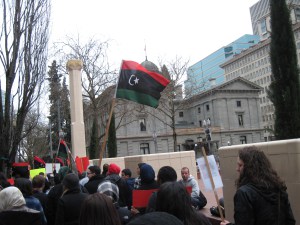 the online radio project will be to amplify the voices of servicemembers about issues such as how to navigate the V.A. system, discharges from service, sexual assault in the military, and the continued deployment of traumatized troops to U.S.-occupied countries, as well as to draw in more supporters of the work of the current G.I. coffeehouses. (If you have new media, video, and/or web skills that you would like to contribute to the radio project or wish to know more about the National G.I. Coffeehouse Network, get in touch with kimber [at] warresisters.org (kimber@wa)kimber [at] warresisters.org (rresisters.org).) Kimber and Ali joined members of Civilian Solider Alliance, Coffee Strong, and IVAW in an “open-mic” event at Coffee Strong and some clips from the Coffee Strong open-mic series are currently up on the Coffee Strong YouTube account.
the online radio project will be to amplify the voices of servicemembers about issues such as how to navigate the V.A. system, discharges from service, sexual assault in the military, and the continued deployment of traumatized troops to U.S.-occupied countries, as well as to draw in more supporters of the work of the current G.I. coffeehouses. (If you have new media, video, and/or web skills that you would like to contribute to the radio project or wish to know more about the National G.I. Coffeehouse Network, get in touch with kimber [at] warresisters.org (kimber@wa)kimber [at] warresisters.org (rresisters.org).) Kimber and Ali joined members of Civilian Solider Alliance, Coffee Strong, and IVAW in an “open-mic” event at Coffee Strong and some clips from the Coffee Strong open-mic series are currently up on the Coffee Strong YouTube account.
Similar to the Portland gathering a few days earlier WRL’s national organizing team held a meeting of the WRL local in San Francisco – WRL West, the night they arrived in the Bay. There, long time members of that chapter, as well as members of a new East Bay chapter of Veterans for Peace, and the Bay Area Code Pink, also discussed what local and global events had them excited, what their needs were, and how this might point to new directions.
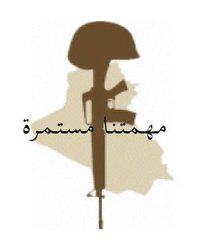 Also in San Fransisco, Ali Issa met with members of the reparations committee of Iraq Veterans Against the War, as well as the national coordinator of US Labor Against the War, which is also involved in conceptualizing and implementing reparations for the Iraqi people. While the aims of the reparations are broad, including various initiatives to address to US military contractors, the Iraqi refugee crisis, as well as the long term health problems left in the wake the US attack on and continuing occupation of Iraq, its short term focus is on supporting Iraqi labor organizing rights and developing a strategy for defending Iraqi economic sovereignty. That these initiatives may be achievable and meet real Iraqi needs is contingent on direct contact and leadership from Iraqi organizers. Fortunately, WRL and USLAW are strengthening their ties to Hassan Jum’a Awad, president of the Iraqi Federation of Oil Unions, as well as Falah Alwan , President of the Federation of Worker’s Councils and Unions in Iraq. This is in addition to making contacts with the youth and unemployed organizers that have been gathering to demand social change in Iraq for the past several weeks. In the short term, the reparations committee is investigating the contracts oil companies, including Occidental and Exxon-Mobile, are negotiating with the Iraqi government. These contracts are kept under strict secrecy despite oil minister Shahrastni‘s promises of “transparency.” With the assistance of oil expert and IVAW advisor Antonia Juhasz, the demands of Iraq youth and workers that their resources remain under their control, may soon turn into a transnational campaign.
Also in San Fransisco, Ali Issa met with members of the reparations committee of Iraq Veterans Against the War, as well as the national coordinator of US Labor Against the War, which is also involved in conceptualizing and implementing reparations for the Iraqi people. While the aims of the reparations are broad, including various initiatives to address to US military contractors, the Iraqi refugee crisis, as well as the long term health problems left in the wake the US attack on and continuing occupation of Iraq, its short term focus is on supporting Iraqi labor organizing rights and developing a strategy for defending Iraqi economic sovereignty. That these initiatives may be achievable and meet real Iraqi needs is contingent on direct contact and leadership from Iraqi organizers. Fortunately, WRL and USLAW are strengthening their ties to Hassan Jum’a Awad, president of the Iraqi Federation of Oil Unions, as well as Falah Alwan , President of the Federation of Worker’s Councils and Unions in Iraq. This is in addition to making contacts with the youth and unemployed organizers that have been gathering to demand social change in Iraq for the past several weeks. In the short term, the reparations committee is investigating the contracts oil companies, including Occidental and Exxon-Mobile, are negotiating with the Iraqi government. These contracts are kept under strict secrecy despite oil minister Shahrastni‘s promises of “transparency.” With the assistance of oil expert and IVAW advisor Antonia Juhasz, the demands of Iraq youth and workers that their resources remain under their control, may soon turn into a transnational campaign.
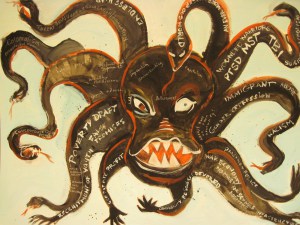 WRL also participated in a civilian ally strategy session in the Bay Area with members of Civilian Solider Alliance and the Catalyst Project in connection to the Operation Recovery campaign. IVAW organizers will be busy with internal campaign work this spring and summer, and will be building with civilian supporters during this time as well, so be on the lookout for updates and calls for support! WRL’s primary work in the months ahead will be focused on plugging in civilian allies into the campaign and helping to connect IVAW’s work to supporting that of communities who have been directly impacted by U.S. war and occupation. In addition, we will be focused on getting IVAW members, WRL members, and other campaign supporters trained in G.I. rights, some of whom will eventually go on to become counselors for the G.I. Rights Hotline. G.I. rights information and skill-sharing will also be of great use to Operation Recovery organizers, who have been undertaking massive outreach at various military bases over recent months, in their efforts to support servicemembers who are facing multiple deployments after being diagnosed with military sexual trauma, traumatic brain injury, and/or post traumatic stress disorder. G.I. rights information sharing will also be a focus of the programming of the Coffee Strong/G.I. Voice radio project, much of it intended for active duty servicemembers on military bases.
WRL also participated in a civilian ally strategy session in the Bay Area with members of Civilian Solider Alliance and the Catalyst Project in connection to the Operation Recovery campaign. IVAW organizers will be busy with internal campaign work this spring and summer, and will be building with civilian supporters during this time as well, so be on the lookout for updates and calls for support! WRL’s primary work in the months ahead will be focused on plugging in civilian allies into the campaign and helping to connect IVAW’s work to supporting that of communities who have been directly impacted by U.S. war and occupation. In addition, we will be focused on getting IVAW members, WRL members, and other campaign supporters trained in G.I. rights, some of whom will eventually go on to become counselors for the G.I. Rights Hotline. G.I. rights information and skill-sharing will also be of great use to Operation Recovery organizers, who have been undertaking massive outreach at various military bases over recent months, in their efforts to support servicemembers who are facing multiple deployments after being diagnosed with military sexual trauma, traumatic brain injury, and/or post traumatic stress disorder. G.I. rights information sharing will also be a focus of the programming of the Coffee Strong/G.I. Voice radio project, much of it intended for active duty servicemembers on military bases.
Finally, as this May will mark the first of many popular education-based ally skills-building trainings for peace movement activists all over the country organized by WRL staff and supporters, Kimber sat down with members of the New Priorities Network about the possibility of the Bay Area New Priorities group hosting a training. This is a network of organizations that has been busy over the past few months with creating a decentralized campaign to push local governments and organizations to call for the federal government to reprioritize spending on community needs rather than war and militarism. As this campaign-building process requires peace movement activists to “break out of their movement silo” and examine their current organizing work through a cross-movement lens, this is a training on just that. It also requires all of us to look at the power and privilege that we bring into movement work and to support the leadership and vision of those communities most directly impacted by war and militarism, incorporating both into the strategy and tactics of our campaign work.



